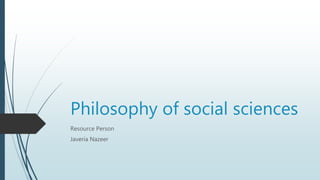
philosophy of Social science
- 1. Philosophy of social sciences Resource Person Javeria Nazeer
- 2. Paradigm System of thinking Set of propositions that explains how the world is perceived Broad theoretical formulations Help in obtaining hypotheses Set of beliefs, values & techniques shared by scientific community Includes basic assumptions, important questions to be answered, research techniques to be used
- 3. Paradigm Describing something as a ‘research paradigm’ means that it is an established model, accepted by a substantial number of people in a research community. For example, it could be argued that positivism and interpretivism are (rival) paradigms of research within sociology. Each academic discipline may have its own research paradigms.
- 4. Approach A ‘research approach’ has a less evaluative meaning: it simply refers to a way of doing research, which may or may not be accepted by a significant proportion of a research community. For example, ethnomethodology, grounded theory, narrative analysis and auto-ethnography could all be described as different research approaches. 'Approaches' could refer to designs, methods of data collection or analysis.
- 5. Three major paradigms Positivism……………………………………Auguste Comte & Emily Durkheim Interpretivism………………………………Vicco, Dilthery & Weber Critical………………………………………Karl Marx
- 6. Positivism Oldest Paradigm Reality is out there. Independent of human consciousness Natural and unchangeable laws Deductive General to specific Abstract to concrete
- 7. Interpretivism/Anti-Positivism Anti-positivism Reality is not there, but in the mind of people based on the definition people attach to it. Subjective Specific to general Concrete to abstract Represents reality symbolically in descriptive form
- 8. Critical Reality is created by powerful people They manipulate conditions and brain wash others to perceive things the way they want them to To serve the needs of the powerful
- 10. Differentiation between Model and Theory(Paradigm) Model Model is a verbal or visual representation of a concept Model is used to simplify things and is more practical Model simplify a concept and most of time its tangible Theory Theory is a conceptual framework of an idea Theory is used to explain things and is less practical Theory explains a phenomenon and is more intangible
- 11. Philosophical grounds of Theory Ontology Epistemology Methodology Axiology
- 12. Ontology What is knowable? Is there a real world independent of our knowledge?
- 13. Ontology Ontology is the starting point of all research, after which one’s epistemological and methodological positions logically follow. A dictionary definition of the term may describe it as the image of social reality upon which a theory is based. Norman Blaikie offers a fuller definition, suggesting that ontological claims are “claims and assumptions that are made about the nature of social reality, claims about what exists, what it looks like, what units make it up and how these units interact with each other. In short, ontological assumptions are concerned with what we believe constitutes social reality” (Blaikie, 2000, p. 8)
- 14. Epistemology How knowledge is generated or created? How relation between social phenomenon is identified? School of thoughts Idealists Empiricists realists
- 15. Epistemology Epistemology, one of the core branches of philosophy, is concerned with the theory of knowledge, especially in regard to its methods, validation and the possible ways of gaining knowledge of social reality, whatever it is understood to be. In short, claims about how what is assumed to exist can be known (Blaikie, 2000, p. 8). Derived from the Greek words episteme (knowledge) and logos (reason), epistemology focuses on the knowledge-gathering process and is concerned with developing new models or theories that are better than competing models and theories. Knowledge, and the ways of discovering it, is not static, but forever changing. When reflecting on theories, and concepts in general, researchers need to reflect on the assumptions on which they are based and where they originate from in the first place.
- 16. Methodology Methodology refers to general principles which underline how we investigate the social world and how we demonstrate that the knowledge generated is valid. Research methods refers to the more practical issues of choosing an appropriate research design – perhaps an experiment or a survey – to answer a research question, and then designing instruments to generate data.
- 17. Axiology About values and ethics Axiology is a branch of philosophy that studies judgements about the value. Specifically, axiology is engaged with assessment of the role of researcher’s own value on all stages of the research process. In simple terms, axiology focuses on what do you value in your research. This is important because your values affect how you conduct your research and what do you value in your research findings.
- 18. Philosophical Alignment The researcher is seeking to maximize the overlap between ontological, epistemological and axiological positions Philosophical alignment leads to philosophical trinity: The alignment between the researcher’s belief system, the research paradigm and research methodology
- 19. What paradigm tells us? The choice of a particular "paradigm" normally points to a particular "approach", which usually implies the adoption of specific "methods", which in turn suggest the use of specific data generation techniques and interpretations.
- 20. What paradigm tells us? Research paradigm refers to mainly ontological and epistemological assumptions while research approach (or strategy) refers to whether an inductive, deductive or mixed strategy is used by researcher. Adopting any mix of paradigmatic position with research approach depends on the question in hand. Of course some combinations will be mutually exclusive.
